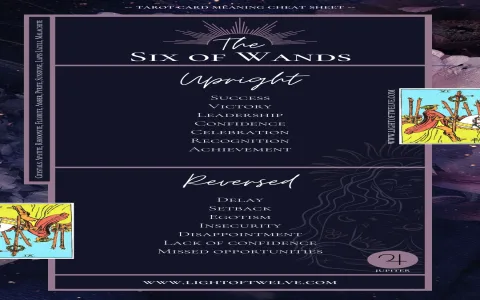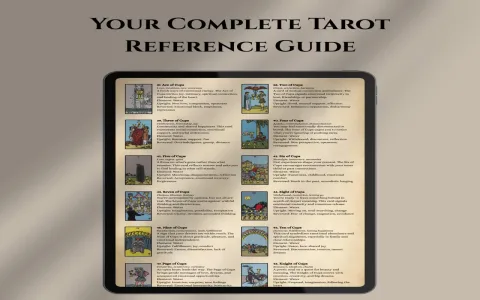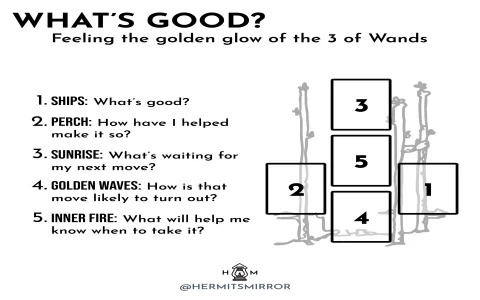The Absolute Grind Before the Transition
You know that feeling? The one where you clock in every morning and immediately feel the air being sucked out of the room? Yeah, I was there. My job—the one I had poured maybe four years of my life into—had totally flatlined. I wasn’t learning, I wasn’t growing, and frankly, the vibe was getting toxic. It wasn’t full-blown chaos, just this slow, stagnant, soul-crushing boredom. I knew I needed to bail, but fear is a powerful glue, man. It kept me stuck, thinking: “What if the next thing is worse?”
Pulling the Card and Interpreting the Move
I finally got sick of the whining and decided to stop overthinking and start doing. I grabbed my old Tarot deck. I didn’t bother with some complex Celtic Cross nonsense; I just shuffled and pulled a single card asking, “What’s the most sensible, practical career step right now?”
Out popped the Six of Spades. Yeah, yeah, I know most folks call it the Six of Swords, but my deck is weirdly labeled. Spades, Swords, whatever. The image was clear as day: a small boat moving across water, carrying people and their stuff away from choppy waves towards smoother seas. It wasn’t a sudden, frantic leap. It was a managed transfer.

That visual hit me. My problem wasn’t that I needed to quit immediately; my problem was that I hadn’t prepared the boat yet. I was sitting on the dock staring at the storm, not planning the voyage. The card wasn’t telling me to run; it was telling me to strategize the departure.
Designing the Practice: My Phased Exit Plan
This became my career practice for the next couple of months. I literally logged every action as a step toward ‘calmer waters.’ I broke down the Six of Spades guidance into three non-negotiable phases.
- Phase 1: Securing the Raft (Financial Buffer): The first thing I addressed was the safety net. Transitioning takes money, and I had zero desire to take a bad job just because rent was due. I immediately audited my spending. I cut down hard on eating out and subscriptions. I locked down $5,000 in a separate account. That number felt like the solid ground I needed to stand on before I started seriously looking.
- Phase 2: Mapping the Destination (Skill Inventory): The job I wanted required different tech skills than the repetitive junk I was currently doing. I spent two weeks, every night, mapping out exactly what gaps existed. I immediately enrolled in two cheap online courses and started banging out practice projects. My goal wasn’t just to update the resume; it was to actually build the skills I needed for the place I was going.
- Phase 3: Smooth Sailing (The Non-Frantic Search): I promised myself I would not notify my current boss until I had signed a contract for the new job. The Six of Spades is about avoiding unnecessary turbulence, so I kept my head down, continued to perform at work, and treated my job search like a secret second shift.
Operating in Stealth and Hitting the Wall
Let me tell you, running Phase 3 was brutal. I was working nine hours at the old gig, then coming home and spending another four hours interviewing, networking, and studying. My weekends vanished. I was exhausted. I was pounding the pavement, sending applications, and getting mostly silence. Rejection after rejection kept piling up, and I started doubting the whole process.
There was this one point, about six weeks in, where I got totally crushed. A company I had interviewed with four times, a company that seemed like my perfect ‘calm waters,’ suddenly pulled the offer due to a budget freeze. I felt like the whole boat had sprung a leak.
I almost gave up. I actually pulled the deck again, mad, demanding an answer. And again, the Six of Spades stared back at me. This time, I realized the transition isn’t just a single trip; it’s the persistence of the ferryman. The card wasn’t lying; it just meant the journey involves unexpected obstacles. The message became: The action is the perseverance. I had to keep rowing, even when the waves got rough again.
The Breakthrough and the Final Realization
I took a breath, ignored the sadness, and kept applying. I ramped up my networking efforts, deciding to talk to five new people every week, no matter what. I pushed through that tough patch, knowing I had the financial buffer (Phase 1) and the skills (Phase 2) to keep going.
Three weeks later, I got two job offers within 48 hours. Both were significantly better than my old role, offering exactly the kind of professional growth I was looking for. When I signed the final contract, I immediately gave my notice—a calm, professional two weeks, no drama.
Walking out on that last day, I realized the Six of Spades had been the perfect guide. It didn’t just tell me to leave; it forced me to be mature, calculate my risk, and transition with dignity. I didn’t escape the storm by jumping overboard; I successfully navigated the vessel to a much better harbor. The practical lesson learned: In career shifts, never react; always move deliberately. That’s what puts you ahead.






